#the forever war
Explore tagged Tumblr posts
Text

The Forever War by Joe Haldeman is a classic of science fiction, considered a thematic response to the more pro-military Starship Troopers by Heinlein (the book; not the more satiric film adaptation). It draws on Haldeman's own real-life experiences in Vietnam. Private William Mandella was supposed to be a physics teacher; instead he's been drafted into the first class of soldiers tasked with fighting a newly discovered alien race so far from earth that dozens of years will pass while he's away. By the time he returns, he'll no longer recognize the planet he left behind.
This rather bleak novel depicts the experience of soldiers being sent here or there at the orders of an invisible higher-up. Its plot twists pillory the very idea of a war against a foreign enemy poorly understood, an economically motivated war with no true goals. The military's promises of salary and reward all ultimately come to nothing; the only place vets know how to live seems to be back in the war, where their salary is worthless. The rhetoric of courage or sacrifice is empty, and the soldiers know it. It's an effective, intriguing novel, and its use of time dilation as metaphor works perfectly—after every lost altercation, they seem to return to find that the war has changed completely, and all the worst injuries seem to come from space travel rather than from the aliens themselves. The killing feels more like massacre than anything else.
I found the 70s book's look at the future fascinating, a work of bleak irony in which the earth, in fighting this universe war, becomes what it originally claimed to be fighting against. Haldeman depicts the world moving towards homosexuality, but interestingly, seems to see it as a complete binary switch—not a hint of bisexuality in the works, just a switch to a homosexual world that sees heterosexual sex as taboo.
The overall ending twist was excellent, though the characters' endings were a bit too neat-feeling. A really good read, and a necessary one for considering the history of sci fi and its takes on our potential futures.
Content warnings for homophobia, violence, death, xenophobia, sexual assault.
17 notes
·
View notes
Text
guy who calls the forever war 'lesbians in space' because of the last arc
9 notes
·
View notes
Text
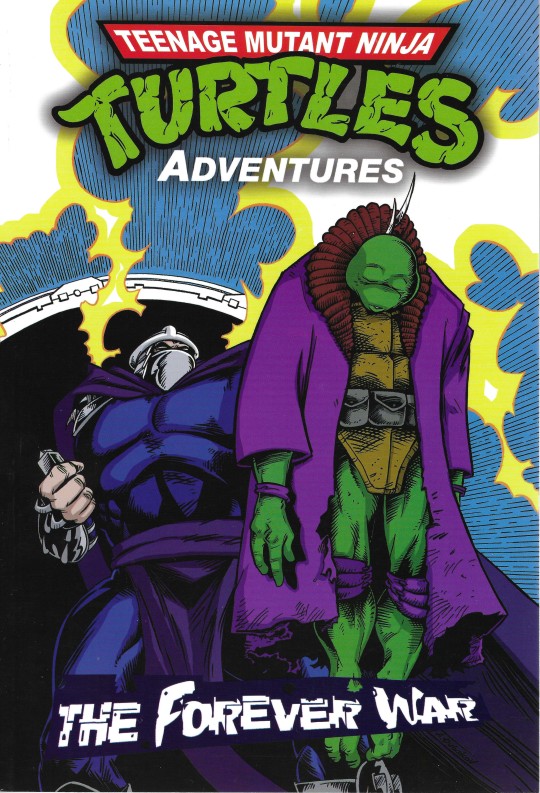

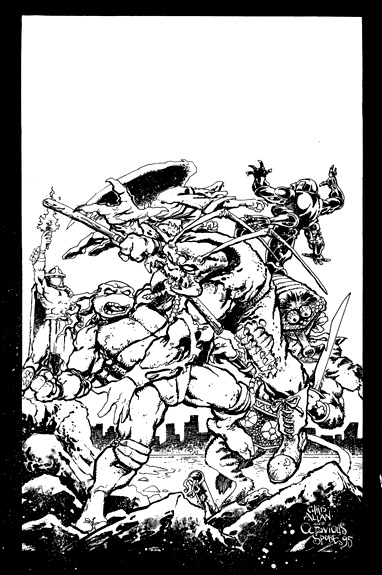
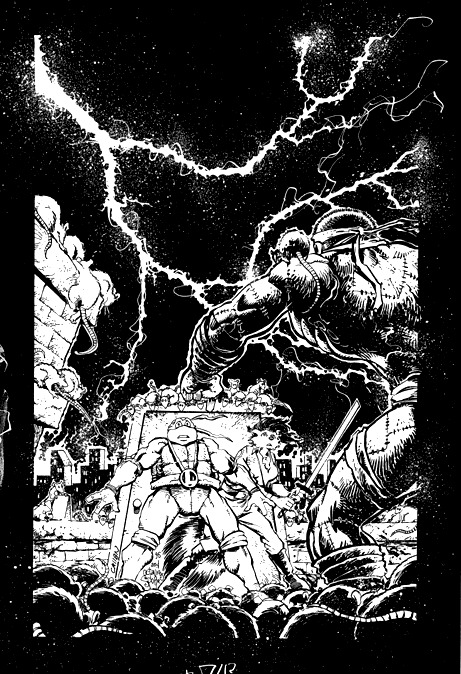
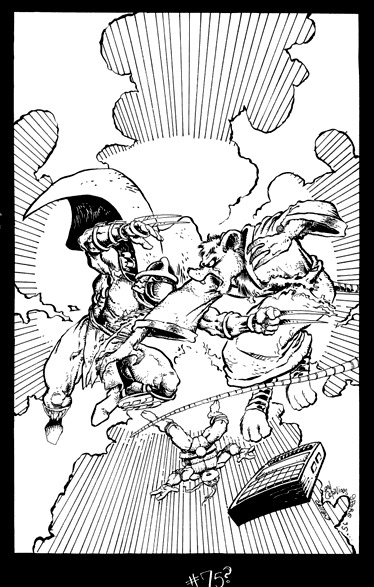
TMNT ADVENTURES: THE FOREVER WAR (kind of FAN MADE)
April 2024
By Steve Murphy, Chris Allan, Andrew Modeen, Artem Tsarkov, Arseniy Dubakov, Egor Prutov , Jon D'Agostino, Dmitry Bobrovnik, Yuri Kochin, and Jim Lawson.

The Shredder finally succeeds at erasing the Turtles from history and conquering the world. But the Turtles and Splinter will try to defeat him and ensure their existence in this conclusion of the iconic Archie series.
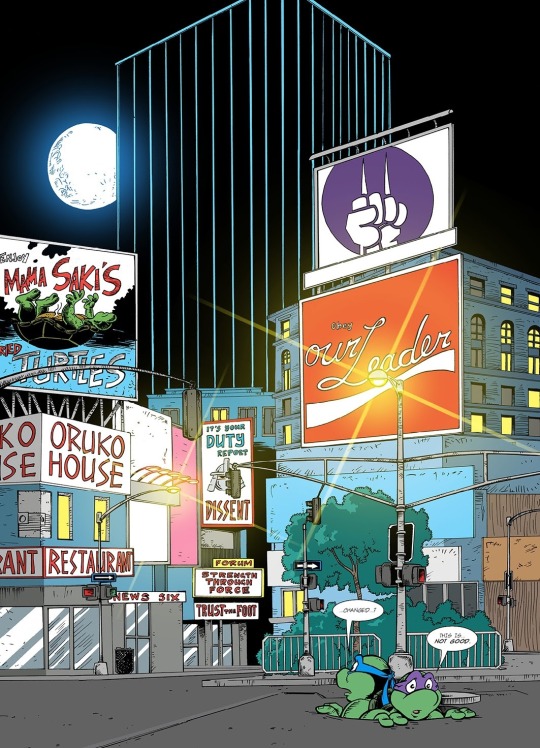
SCORE: 8
You'll have to forgive the lack of images, but it is very hard to scan this book (I'll see what I can do for the video review, but I may need to work with photos of it). In any case, this is another of those fan projects by Arseniy Dubakov and Andrew Modeen... but with some interesting twists in its genesis.
You probably remember that this saga was announced in 1995 before the Archie adventures were canceled, and fans have been speculating forever about how the story ended.
In 2009 we almost got the conclusion by the original team (Steve Murphy and Chris Allan), but the turtles were sold to Viacom and the plans never materialized. In any case, Murphy couldn't remember where he was going with the story, so it would be fair to say that it was never going to be the same arc.
More recently, Chris Allan met Arseniy and the two got together to make this project happen. The first chapter (which was made public at some point in the past few years), was mostly recovered from 1995, but it had been colored and edited by the new team.
As far as I know, the second chapter was plotted by Steve Murphy, and I can say that the two first chapters feel the most like the original book... with some annoying differences.
After that, the book does its job, and the story works very well. The project was promoted as "closing all open plots" of the original series, but fortunately, it only tried to solve a time paradox that has always been a problem in that book. I applaud the restrain of the writers from bringing up every single plot point just to let readers know they read the book (as is usually the case with these projects).
The art is probably the most spectacular aspect of the book. It's an updated look for the Archie adventures that for the most part, looks like a continuation of the story. There are some stylistic differences when it comes to inking after chapter one, but you get used to them after a while.
The book comes with two back-up stories. One penciled by Jim Lawson that tries to make sense of the convoluted Archie timeline (specifically about which Shredder you were looking at in each adventure). The second backup is some sort of epilogue to Forever War that will leave you with more questions than answers.
For me, the weakest point of the book is the "overwriting" from Andrew.
It's hard to explain, but Andrew goes into these long narrations directed at the reader that just feel overproduced and underproduced at the same time. There is an overuse of "Modeen" expressions that can be said by any character at any time. Perhaps because he is not doing the writing/plotting alone, this is his best story yet. We know Andrew is a fan, an we know he can write. But it would be nice if he could work on his dialogues and... I'm going to call it now... think twice before adding an unnecessary celebrity quote at the beginning of each chapter.
I am not sure if this was in the original plot, but some elements in this story were even darker than the original series (like slashing a classic character in two). I get that we all grew up and we can take it, but this should be a continuation of that book, and I feel that it wasn't this bloody (most of the time).
But again, this story worked for me, it didn't bring up characters and plots just for the sake of it, and the turtles were front and center.
Should we consider this an ending for the Archie series? Well, just like it happened with Volume 3 before Urban Legends came out, this is all we can get. It's technically just the story, and not a proper ending, so you could still consider "Year of the Turtle" the final story (I assume that it not being referenced was intentional). There is one reference to "TMNT: Odyssey" (because for some reason, all these projects need to share the same multiverse), but it can be easily ignored... I think.
Maybe one day IDW will decide to do their own version of Forever War, but I don't think Chris Allan would go through this ordeal again... I think it could be published as is (fourth-wall monologuing included). Perhaps censoring some of the blood, to keep it consistent with Archie guidelines.
Now, let's take a look at those spoilers after the break...
You guessed it, most of the chapters take place in an alternate timeline. This allows for familiar characters to return even if they were already dead. And also introduces Carter to the Archie universe... and he may be British... I don't know.
Most characters show up to die... which isn't unusual on alternate timeline stories, but feels like a waste. Carter and Claire had very little time to do anything, and Claire being April's sister is an interesting twist... but I wonder what caused it? It is implied that they may have been separated at some point, but the existence of the same photograph without her suggests there wee further alterations to that timeline.
The Mutanimals play the bad guys... probably for the better. I wonder if the reason they didn't undo their deaths, or brought back Cherubae, was so that it could all tie into "TMNT: Odyssey"? Whatever the reason was, I appreciate it.
Perhaps the biggest reveal was that Chet was the Rat King. While this is a fun twist, some things are a bit too convenient. Why did he choose the H'antaan name? And why didn't he ever mentioned this to anyone in the original timeline? (Apart from the flashback in this book).
Overall, Shredder's plan makes sense (for once), although he somehow recreated all the mutants from the original series, even the ones that weren't mutants (like Katmandu)... perhaps he and Al'Falqa simply joined the cause.
There isn't much characterization for the turtles, but I think is in line with the original book as well. And to be fair, the main focus is the story.
The Jim Lawson back-up also introduces another problem, a Shredder that finally remember everything (this may be the one in "Year of the Turtle"). Mr. Null decides to share all of this, searching for the Turnstone (a "TMNT: Odyssey" plot). I don't like these fan-projects being all connected, but I appreciate the long explanation of the Shredder paradox in the Archie adventures. It also officialized that Armaggon created the Archie universe.
I would have appreciated a Mr. Null origin story... but I guess that would have clashed with "Odyssey" (and this is why I don't like them being connected).
I may sound negative, but my nitpicks only took two points from the overall score. I am happy with the results, and I think we can now stop wondering what it could have been.
Although... can you imagine what it could have been in 1995?
That my friends... is the forever war.
[Include some super serious celebrity quote here]
#comics#review#tmnt#teenage mutant ninja turtles#post modern age#archie comics#2024#1995#teenage mutant ninja turtles adventures#the forever war#fan fiction#chris allan
11 notes
·
View notes
Text

Wanna play bingo? How similar are you to me?
#bingo#dnd#chonny jash#scp#sea of theives#minecraft#the wrecklunds#hp lovecraft#roblox#lego dreamzzz#hello from the hallowoods#welcome to nightvale#barns courtney#the forever war#sex pistols#the magnus archives#ninjago#goodnight texas#mwii#resident evil village#dead by daylight#samurai jack#hozier#diablo iv#igorrr
42 notes
·
View notes
Text

A sketch of Marygay Potter from The Forever War by Joe Haldeman from 1974.
The dress is described to be see-through, with hands showing showing up at strategic spot depending on your line of sight. I actually totally forgot her description in the book, whoops.
The book is really cool. Like a lot of older science fiction, its in that weird position of being at the same time progressive, critical of society but also prudent and at times even reactionary. In short a product of its time. A straight man version of sexual liberation seems to be women being very dtf. That being said it is also nice to see sex being treated in such a nonchalance way.
Instead of a plot synopsis i am just going to throw some key-words in.
Vietnam war but in space
veteran returning to a very changed society
state sanctioned homosexuality (not the mc tho)
A love that endures time and space (literally)
7 notes
·
View notes
Text

Robot Jox - it's Starship Troopers meets Pacific Rim, I guess?
A blu-ray for a film I've never heard of with a fetching mecha cover crossed my path the other day. Released in 1990 with an apparent mission statement to bring the Saturday-morning The Transformers cartoon to the big screen in live-action, Robot Jox had a production reportedly rife with tension between Vietnam-vet The Forever War author Joe Haldeman, who wanted to make an intelligent anti-war film, and director Stuart Gordon, who wanted to make a silly movie about robots punching each other. But in their epic mechanoid face-off, who came out on top? Fire your rocket-powered fist at the "Keep reading" button to keep reading and find out!
A surprisingly-charming halfheartedly-narrated intro tells us what's going on: after nuclear holocaust wrecks the planet, war is outlawed, with the US and Russia fielding "jockies" to duel in giant robots to settle disputes instead. Our protagonist, undefeated cynical misogynist Achilles, is pitted against Alexander, a bloodthirsty champion who kills everyone he defeats.
Any giant robot story lives or dies on the quality of its giant robot fight scenes, whether it's the incomprehensible mechanical mayhem of Michael Bay's Transformers films, the comic-book heroics of The Iron Giant, or men in cardboard suits punching the shit out of each other in Power Rangers. Unfortunately, Robot Jox is a mixed bag in this regard. Shots achieved with puppetry or miniatures generally look pretty solid, with a practical-effect weightiness that's often missing in modern features. Shots done with stop-motion, which unfortunately comprise a significant portion of each fight, probably looked bad at the time and look rubbish now.
Not counting the brief prologue, the film is bookended by just two giant-robot fights, with a few out-of-robot training scenes or scuffles padding out the runtime between them. On a shoestring budget, this was really the only option, but that doesn't make it good. The problem with all of these fights is a completely boneheaded lack of choreography; they feel like fights directed by someone who's never even seen so much as a boxing match. Although the intermediary fight between protagonist Achilles and designated woman Athena does manage some remarkable chemistry between them, their actual motions are so slow and awkward that it looks like they're in giant robots then, too.
I think one of the things I most enjoyed about this movie, which I am almost tempted to call deliberate, was how frequently it would lull me into a false sense of security with long scenes populated by brainless stereotypes and sci-fi clichés, only to then hit me with something marginally clever. It felt like the movie wanted me to view it as dumb schlock, so that it could actually leave an impression on me with the moments it viewed as important. I sometimes find this approach more effective than stories which want you to think that every single beat is capital-I Important.
For instance, during the aforementioned fight between Achilles and Athena, it starts because Athena shows up at Achilles' door late at night, ostensibly to wish him luck before the big match and thank him for some token gift he gave her earlier. It's implied she's going to undress, and for a second I genuinely was suckered into thinking she was going to have sex with him, because that's just the kind of movie this is. But then she pulls out a dart gun she's got stashed in her shirt and tries to sedate him. Obviously, that's a cliché all of its own, but I felt like I could never be sure exactly which level of badness the film was operating on. At the end of the fight, Achilles manages to pin Athena down on the bed, and in a moment of frustration, implicitly admits to her that the only reason he agreed to come back for the final match was to spare her from having to take his place as America's champion. She appears shocked, and there's a tender (?) moment between them, and he tries to kiss her, and then she kicks him in the balls and scurries out of the room while he writhes on the floor. (Incidentally, I loved the way he escapes after she locks him in: by remotely controlling his flying car outside and driving it through the bedroom wall.)
You also see this technique being used on a thematic level. One of the film's subplots involves genetically-modified humans, bred through eugenics to be the strongest warriors ever; Athena is one of these. Very early on, you might think the film is unironically doing eugenics. Then, you might think it's doing eugenics satirically; sure, these guys are super-soldiers, but they're fucked-up none-people borne of a moral deficiency in their society. But no, what the film actually lands on is that the government is doing eugenics, but it just kind of doesn't work: in one of the film's better scenes, Athena describes studying Achilles' unconscious body, to try and work out what the difference is supposed to be between them; what makes him the ultimate champion, and perhaps by extension, what makes her a genetically-superior paragon. "But there's nothing special about your body," she concludes, "so what makes you different?"
The gender politics of this film aren't exactly facile, but they're definitely of-a-kind with typical '80s male feminism, where you have a strong female character who challenges traditional concepts of femininity by adopting masculine physical traits—short hair, a toned body, a sharp tongue and willingness to fight—and surround her by men who are sexist towards her, so that you can ultimately have her prove them wrong, albeit while also partaking in unironic objectification because that's how you sell tickets. Towards the start, before the film's actual beliefs start to become apparent, the relentless sexual harassment is miserable to watch.
I think what ultimately won me over is that Athena is genuinely a stronger character than many female leads are even in modern films. She has a ton of agency, constantly outperforms and outsmarts the men, and has a character arc all of her own, as she is confronted with the brutal reality of a fight to the death. Although Achilles does ultimately replace her partway through the final battle, and she acknowledges him by finally kissing him, the film doesn't make the mistake of showing Achilles to be the better fighter: rather, it's obvious throughout the film that Alexander is unmatched, because he alone has the raw killer instinct needed to win. Neither of them can beat him, and that's a good thing! Reflecting on this film from perhaps a more sexually puritan era—at least in terms of mainstream media—the unabashed horniness is honestly refreshing, in a way.
In both scenes of chauvinist bravado, or of bitter contemplation, the film iterates on themes of luck, fear, and bravery. Tex Conway, the character who embodies these ideals, a former jox turns coach, is slowly deconstructed as the plot unfolds. He starts out as a leering racist in a cowboy hat, albeit ostensibly perhaps with a little bit of home-grown vim and intuition... and slowly is revealed to be a calculating coward. I loved the way he uses racist rhetoric to shift suspicion onto the team's Japanese engineer, Matsumoto. And I particularly loved the scene where Matsumoto accuses him in private. It's obvious through the performances that Matsumoto can't quite believe it, can't quite bring himself to shoot Tex... a moment of weakness Tex is eager to take advantage of, just as he was in his famous final bout as a jox. The "luck" Tex loves to talk about turns out to have just been cheating, the Russians having deliberately exposed their own weak point to him in order to buy his loyalty for long-term plans. As a villain, he's surprisingly multifaceted: Matsumoto begs him, "There was a time when you were like Achilles—a proud soldier. We always remain all the people we've been. The oldest man... has a child inside him. Somewhere inside you, is the real Tex Conway." This plea seems, for just a moment, to make Tex contemplate suicide, before he doubles down and shoots Matsumoto dead. I viewed this as a moment of cowardice in the moment, but ironically, when Tex does eventually take his own life, this too reads as the ultimate act of a coward: once his secret is exposed, he chooses to die rather than face judgement.
People have criticised this movie for its very surface-level worldbuilding, but I honestly liked how little the movie developed most of its sci-fi ideas. You could wring a lot more boring cliché narrative beats out of the genetic-engineering subplot, but what would be the point? The film manages to tell you everything it wants you to know about its sci-fi dystopia in a single shot: Achilles clutching a mask to his face, as he walks past a propaganda poster of a naked, heavily-pregnant woman carrying a crash helmet, big text identifying her as a JOX. For context, there's never been a female jox before, and Tex won't ever allow one. In this post-fallout world, women are reduced down to their bodies, their reproductive apparatus, out of a perverse nationalistic desire for the population to boom once more—America loves a big boom, after all. Opening intro aside, the movie avoids exposition almost entirely, never patronising the viewer by outright stating what it is we're watching with our own eyes.
During the final mecha fight, there's an almost inexplicable scene where Achilles blasts his mech off into space, and Alexander follows him. I wondered: holy shit, are they going to punch each other up in orbit? No, wait, is Achilles going to fly halfway around the globe and crash-land his mech into the Russian government, starting a new world war? Sadly, neither of these beats come to transpire; they simply touch back down in the arena again, so the only possible explanation for the scene's inclusion I can think of is that they simply wanted to evoke the visual of ICBMs. It's this scene, above all the others, which I imagine writer Haldeman cringing at most when seeing the finished product for the first time. Perhaps there is something inherently misguided about wanting to tell a hard-sci-fi war story using a film constructed entirely from childish spectacle, but there can be no doubt that Haldeman's more thoughtful contributions in the script are the only things which give this movie life.
Ironically, of all the fights in the film, it turns out to be the one where Achilles and Alexander shed their robotic armour that winds up being most compelling. The film is often remarkably sparing with its soundtrack, allowing scenes to pass with only diegetic sound, but this one in particular is marked by the hollow sounds of fighting, two men grunting and swinging rebar at one another, landing clumsy blows or missing wildly. At a few points in the film, the camera likes to slowly tilt up and frame Alexander from a low angle, causing him to loom like a giant robot himself, and this technique recurs as Alexander nearly triumphs over Achilles. Then Achilles turns the tables, and they are left exhausted, Alexander reduced to clutching a rock with which to bash Achilles' skull in.
The physical rawness with which Achilles shouts, "We can both live!", belongs in a different, better movie entirely. It's phenomenal. It isn't phenomenal because I've just watched over an hour of corny dialogue with uncertain delivery. It's phenomenal despite that, entirely on its own terms, an objectively great line read exploding with frustration and understanding and desperation all at once.
This impassioned rejection of the nationalism that traps the characters in the film makes for a powerful thematic conclusion, an exclamation point at the end of a clumsy but well-meaning sentence. I admire the film for taking a deconstructive approach, full of bitterness and irony, and yet choosing to end not with a moment of horrified realisation, but on a note of unambiguous sincerity.
Although Pacific Rim is undoubtedly the better film by most objective metrics, I hardly remember what happened in that film, and don't believe it had anything of substance to communicate. I'm sure it was fun to watch in a way Robot Jox cannot come close to matching, but of the two, I find myself far more endeared towards this earlier effort.
Robot Jox definitely isn't a good movie, and in fact I'd say there's no reason at all to watch it—unless, like me, you're a hardcore Transformers fan who's tired of the uninspired stories Hasbro has been pursuing for the last few years, and you want a fix of something with a smidge of interest. For an audience who was bored of the Cold War and of the Transformers by 1990, there's little to like here... but for someone who finds those things to still be compelling, this is a pretty faithful realisation of the vibe.
also yes one of the robots literally has a chainsaw dick it rules
Rating: 5/10
If you enjoyed this review, you can find more like it over on my Letterboxd account.
4 notes
·
View notes
Text
what u think the forever war will be like

what its actually like

#i read the book a long time ago i was just thinking abt it bc i saw the 2nd image#i have seen edge of tomorrow it was not terrible#i just googled 'sci fi action movie' tho it was like all the images lol#chitra.txt#the forever war#sci fi
12 notes
·
View notes
Text
I'll admit the point went over my head when I was younger, and I still sometimes wonder if Verhoeven is so unsubtle about things that you actually don't get the message. Robocop had the same problem: the ultraviolence is s over the top it's like having a megaphone shoved in your face.
Honestly, I thought the animated series based on Starship Troopers of all things got the satire at a level that tween me could understand. Because that, somehow, left a mark on my attitudes towards militarism and military adventurism and just how brutal wartime thinking is. That's even with the show portraying the war with the Arachnids as much more ambiguous with who actually started it (in the movie it's pretty clear that the Federation provoked if not outright invaded the violently territorial Bugs, while in the show while SICOM are shown to be on occasion huge assholes the Bugs actually are expansionist and domineering towards other species), it had this element of cynicism towards war and every episode hammered in "War sucks."
Like, there's a line that sticks with me. The whole episode had been about this brand new combat robot assigned to the unit, and at the end it learned the value of human life and sacrificed itself to save the squad's reporter. The narration from that reporter at the end says something bitterly to the effect of "SICOM decided that the CHAS androids weren't 'cost effective'. Good thing humans come cheap."
Hell of a thing to put in a show aimed at 13 year old boys, huh. Had more of an impact on me than the movie, where the unrelenting boobs and gore drowned out the rest. Okay, to be fair, I was 14. Boobs and gore are awesome when you're 14.
I think the movie wasn't helped for me because I'd read the book, and I liked the book. Again, I was 14, so cut me some slack here. But I was wanting the book, because the big Marauder suits as depicted in the book were awesome sounding. So that didn't help me.
The Arachnids in the books are morally about equal to Humans. Both species are expansionist, violent, have eyes on the same territory and resources, and don't want to share. They're also just as capable of building FTL spaceships as humans, and seem to conduct diplomacy that we never see. But Heinlein wrote the book in response to dialing back the nuclear testing and took inspiration for the society of the Federation from the Roman Republic. He also specifically noted that to him it was basically just a thought experiment that let him play around with some ideas he found intellectually interesting rather than anything he actually supported.
Honestly, if you want a good commentary on this kind of thing, go read The Forever War by Joe Halderman. It's like Starship Troopers only Halderman wrote as part of his psychological recovery from being a combat engineer in Vietnam. It gets how utterly fucked up and fucking stupid war is. Like by the end they're fighting at the ass end of space with spears and bows and arrows for a planet that's a deathtrap, a handful of them survive... and they get home and find out the whole fucking war was a big misunderstanding and humanity has now become so strange they have more in common with the aliens now than the humans who were doing the fighting.
It's got some regressive ideas because, well, it was written in the 1970s, but forward thinking for the time. Homosexuality isn't treated as bad, just a bit confusing to the main character who by the end is also the only straight guy in his unit, and sexual orientation is mentioned as being something that can be altered with a minor medical procedure. Note that this is for people who are "born" (genetically engineered) with their default orientation set to gay. Little things like that. Halderman has admitted he finds those details kind of embarrassing now, but again, he wrote this back in the 1970s so for the time period it's doing its' best.
Anyways that's enough rambling from me.
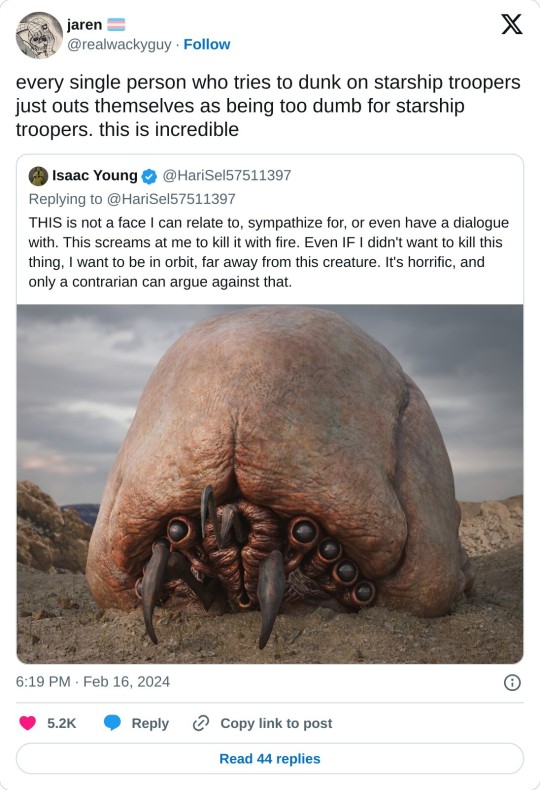
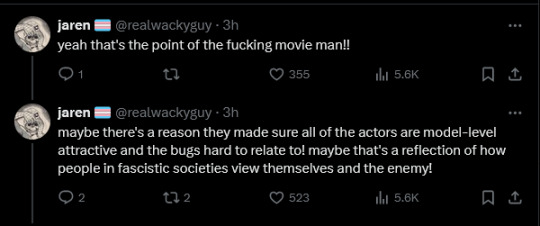
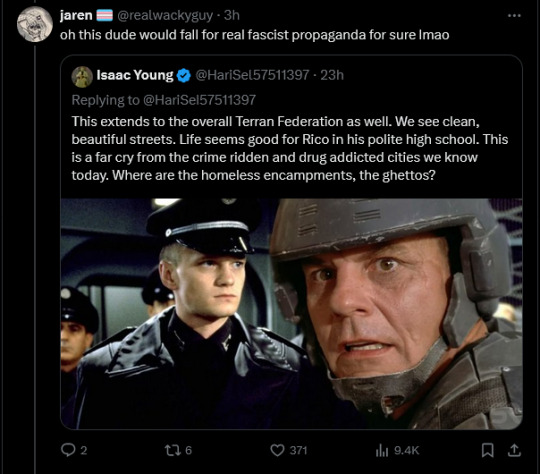
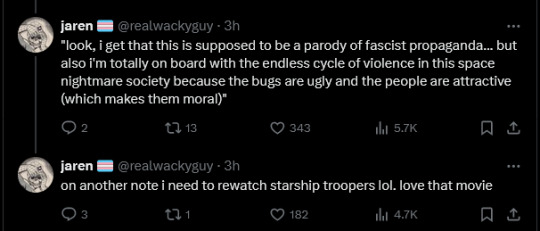
#Starship Troopers#Roughnecks#The Forever War#Forever War#robert a. heinlein#paul verhoeven#joe haldeman#zak talks about stuff#not ffxiv
24K notes
·
View notes
Text

Finding love in the midst of The Forever War.
#fanart#the forever war#joe haldeman#william mandella#marygay potter#scifiart#scifi#military science fiction#military scifi
1 note
·
View note
Text
The Chilling Reality Of The Forever War | Is This Humanity's Future?
What Is It? The YouTube video The Chilling Reality Of The Forever War | Is This Humanity’s Future? by the YouTube channel Quinn’s Ideas: The Chilling Reality Of The Forever War | Is This Humanity’s Future? Description: The engagement of the United States’ in the Vietnam War followed the end of World War II in Asia in 1945. Initially, the US had minimal involvement, but this would change…

View On WordPress
#Humanity#Joe Haldeman#Military#Quinn&039;s Ideas#Science Fiction#Soldier#Tauran#Taurans#The Chilling Reality Of The Forever War | Is This Humanity&039;s Future?#The Forever War#Video#War#YouTube
0 notes
Text
youtube
Exploring TMNT's lost saga: the forever war - TMNT comics
This video explores the almost thirty-year journey of the dedicated fan effort that brought this story to life. From the original comics' untold endings to the fan-project that aimed to conclude the legendary tale, join us as we dissect every aspect of this TMNT story. Special thanks to Arseniy for answering some of my questions! If you want to contact Arseniy to order the Forever war, or pre-order other projects, you can send him an email at: [email protected]
2 notes
·
View notes
Text
there's this horrible school of attempted literary criticism on here that holds that 1. everything in any given author's work is autobiographical, especially if it seems "real" and 2. those themes seeped into the work subconsciously, revealing something about the author that they're either trying to hide or unaware of themself. it drives me up a wall, since it seems to deny the fundamental skills that make people good writers: the empathy to imagine and portray experiences that one hasn't had oneself and the ability to take one's personal emotional experiences or worldview and fold them, consciously, into the unworked clay of a narrative.
#there's a tolkien post that's the bane of my fucking existence -#it's something like 'wwi was normal for me anyway here's a book about how war changes you forever'#and i don't know why you'd think 1. that he didn't know wwi was painful for him#2. that those themes are *unintentional*#anyway it comes up lots of other places -#the 'naive' or 'artless' work is Truer & so This Happened Accidentally#not 'someone thought about this and did it skillfully so it's good'#i'm spiteful today sorry#god i have so many mean thoughts about this tendency vs. the way people talk about ai art
5K notes
·
View notes
Text
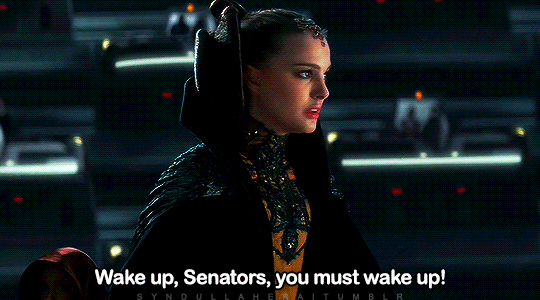
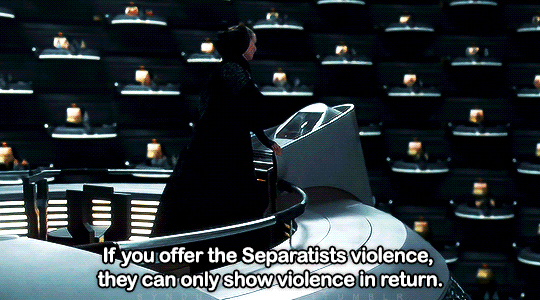




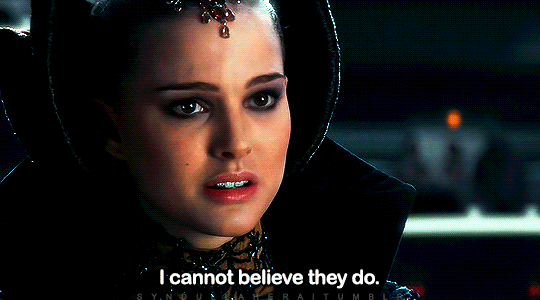
Padmé Amidala in a deleted scene from:
ATTACK OF THE CLONES (2002) - dir. George Lucas
#forever so mad they deleted this scene#swedit#starwarsedit#filmedit#scifiedit#tusermerc#padme amidala#attack of the clones#star wars#*gifs
7K notes
·
View notes
Text
youtube
youtube
#Halo#The Human Race#Salvation#THE AVATAR#BUHFUCKINBYE#Youtube#The forever War#Scifi#Density#Stupidity#Angel#Archangel
0 notes
Text
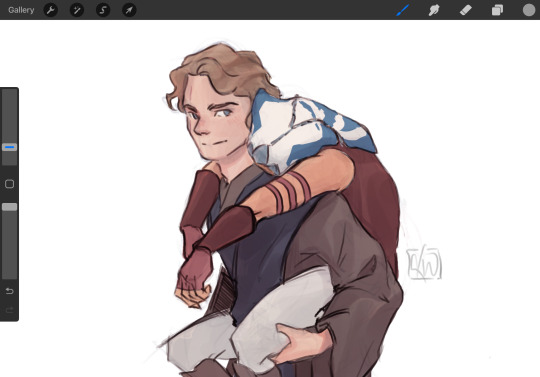
they are so important to me
#core younger sibling memory right here#ahsoka tano#anakin skywalker#i have so many feelings#that will never be articulated. and shall exist in brain purgatory forever#kieran goes insane again#aviiart#star wars#the clone wars#tcw#aw man wtf am I gonna say to my calc teacher now... sorry I didn't finish my work I was busy drawing star wars fanart 😀
3K notes
·
View notes
Text
recently, Israel sent down hellfire missiles near a hospital in Gaza, which are missiles that explode into blades that slam down and cut through anything in their way. (link)
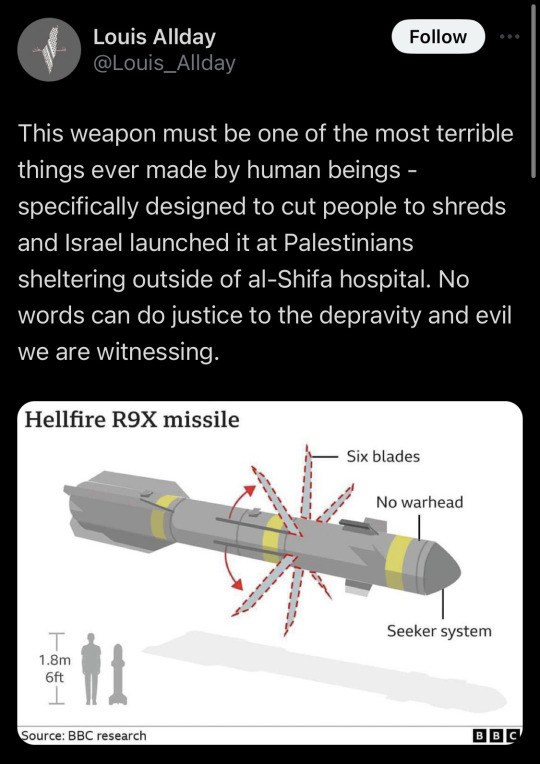
There is a video of a man with his legs newly amputated, screaming in a pool of his own blood. I won’t share the video, because it made me vomit into a toilet, but either trust me it exists or go look for it yourselves.
There is another video of a young girl, crying silently after her legs were blown off in an explosion. She explains tonelessly to the camera man that she doesn’t want fake legs because they’ll just remind her of her real ones. She is 13. (link)
A hospital is told to evacuate and they do, all the while waving white flags in a show of surrender. The IDF shoot at them anyway. (link)

Meanwhile in Israel - they begin to enforce one of the most draconian anti-free-speech laws in history.
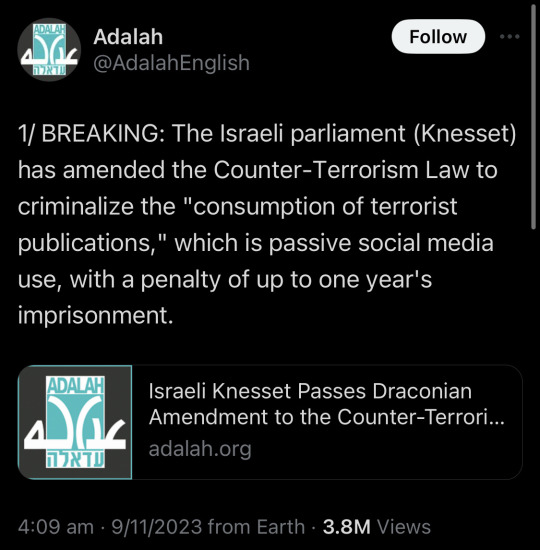


1.link | 2.link | 3.link
Israel also claims to be the “only democracy in the Middle East”.
Israel has bombed hospitals, fishing boats, schools, refugee camps, power sources, water tanks, evacuation routes. They have killed 80% of Palestinian journalists, they have killed 100 UN workers, they have murdered over 4,000 children in 34 days. Because of the lack of food and water, Palestinians have begun to die from starvation, cholera.
If you still support Israel after all this, I believe you’re completely lost. Utterly without any humanity. Nothing could ever excuse this.
In Australia, there is an ongoing list of protests planned, as well as a permanent camp out being set up in Naarm/Melbourne to block Israeli transport company ZIM from shipping weapons. Congressional staffers in the US are finally being gotten through to - in spite of their rampant greed and long-suffering inhumanity, even they can recognise when their phones won't stop ringing with people saying flat out they'll never vote for them again.
Find resources to help Palestine globally at Ceasefiretoday.com
#I just have no words#how can you heal this kind of inhumanity#and I know Israel does not represent the interests of all Jewish people. I know there are Israelis who oppose the genocide full heartedly.#i honestly try to see israel as an entity separate from judaism as a whole bc every anti-zionist jew ive seen in protest denounces it.#says it goes against all the values they hold#and the power that jews who stand against this genocide have#ill just be forever grateful to their bravery to stand against these horrors even though it could alienate them from their peers.#even though i know now israel tries to integrate itself as much as it can in the jewish identity.#how they affirm that netanyahu does NOT speak for them#but the circles everyone keeps running in talking about whether or not israel IS committing genocide (it is)#or whether its committing war crimes (it is and many times over)#how worldleaders wont even say the word ceasefire like its fucking cursed#i feel like we're all being collectively gaslit#I just can’t comprehend all this suffering and having the power to stop it and not DOING ANYTHING#israel#gaza#free palestine#palestine
18K notes
·
View notes